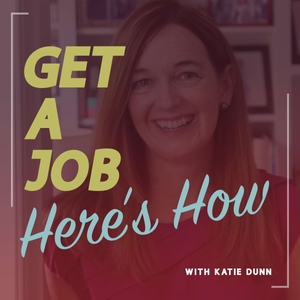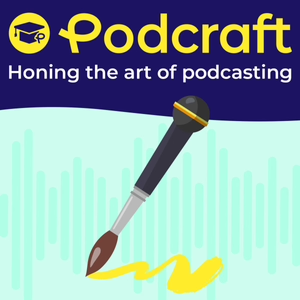
Fathom 23: Making space for women in fishing
08/25/20 • 41 min
Women play an integral role across the seafood supply chain - from caring in fishing families, to policy, net fixing, processing and catching. But why do we know so little about them? Why do their voices remain relatively ‘invisible’, and why does the industry remain male-dominated?
Whilst only scratching the surface, this episode creates the space for women in fishing to share their stories and experiences. Our all-female line-up, interviewed by Harriet Yates-Smith, includes three incredible women, from fisherwomen to researchers.
We first speak to Madeleine Gustavsson, lead researcher at the Women in Fisheries project. She tells us of the in-depth, qualitative research she has conducted with women working in seafood, in order to understand women’s roles, identities and sense of wellbeing in the industry.
Importantly, we explore the ‘culture’ of fishing and the tendency to under-value women’s work and explore ways to overcome this.
Madeleine has unearthed stories of ‘fish entrepreneurs’ - women making space for themselves in a male-dominated industry by developing innovative processing practices and unique marketing ideas. We also talk of fishing families, whose lives are shaped by ‘the rhythms of fishing ... the tides, the weather, the seasons,’ as Madeleine beautifully puts it.
The podcast also includes insightful conversations with two fisherwomen - Ashley, based in Wells-next-the-Sea who calls herself ‘The Female Fisherman on Instagram shares an honest and enthusiastic account of her days out at sea. Jamie, a fifth-generation salmon fisherwoman in rural Alaska talks of set-netting, caring for children, history, and the legacy of her great grandmothers’ fishing knowledge.
Tune in for uplifting, thought-provoking and funny conversations surrounding women and the fishing industry - an important listen for all genders and all ages, and an important step in developing a network of fishing females.
Fathom hosts:
Harriet Yates-Smith
Fathom guests:
Dr Madeleine Gustavsson - lead researcher on Women in Fisheries project
Ashley Mullenger - fisherwoman in Wells-next-the-Sea
Jamie O'Connor - fisherwoman in Alaska
Links
Women in Fisheries
Women in Fisheries policy brief
Women in Fisheries Facebook page
Women in Fisheries Facebook group (women in fisheries only)
Women play an integral role across the seafood supply chain - from caring in fishing families, to policy, net fixing, processing and catching. But why do we know so little about them? Why do their voices remain relatively ‘invisible’, and why does the industry remain male-dominated?
Whilst only scratching the surface, this episode creates the space for women in fishing to share their stories and experiences. Our all-female line-up, interviewed by Harriet Yates-Smith, includes three incredible women, from fisherwomen to researchers.
We first speak to Madeleine Gustavsson, lead researcher at the Women in Fisheries project. She tells us of the in-depth, qualitative research she has conducted with women working in seafood, in order to understand women’s roles, identities and sense of wellbeing in the industry.
Importantly, we explore the ‘culture’ of fishing and the tendency to under-value women’s work and explore ways to overcome this.
Madeleine has unearthed stories of ‘fish entrepreneurs’ - women making space for themselves in a male-dominated industry by developing innovative processing practices and unique marketing ideas. We also talk of fishing families, whose lives are shaped by ‘the rhythms of fishing ... the tides, the weather, the seasons,’ as Madeleine beautifully puts it.
The podcast also includes insightful conversations with two fisherwomen - Ashley, based in Wells-next-the-Sea who calls herself ‘The Female Fisherman on Instagram shares an honest and enthusiastic account of her days out at sea. Jamie, a fifth-generation salmon fisherwoman in rural Alaska talks of set-netting, caring for children, history, and the legacy of her great grandmothers’ fishing knowledge.
Tune in for uplifting, thought-provoking and funny conversations surrounding women and the fishing industry - an important listen for all genders and all ages, and an important step in developing a network of fishing females.
Fathom hosts:
Harriet Yates-Smith
Fathom guests:
Dr Madeleine Gustavsson - lead researcher on Women in Fisheries project
Ashley Mullenger - fisherwoman in Wells-next-the-Sea
Jamie O'Connor - fisherwoman in Alaska
Links
Women in Fisheries
Women in Fisheries policy brief
Women in Fisheries Facebook page
Women in Fisheries Facebook group (women in fisheries only)
Previous Episode

Fathom 22: Trailblazing a pathway for young careers at sea
We release this episode of Fathom on International Youth Day, to celebrate and share the hard work, creativity and forward-looking energy of CFPO Youth Board, who over the past year have been helping to lay the groundwork for the first-ever Commercial Fishing Apprenticeship Standard.
The world can be a daunting and uncertain place for young people leaving school. For those with hands-on skills, the education system in the UK often feels geared toward academia and university, offering little vocational support for those seeking practical careers such as fishing. Meanwhile, the fishing industry is experiencing a dearth of young entrants: the average age of a fisherman is 57.
In Episode 22, podcast hosts Paul and Chris revisit the Commercial Fishing Apprenticeship Standard being created by the CFPO and its Youth Board, in partnership with the Institute for Apprenticeships. Work on the apprenticeship began in September of 2019 and is now well beyond the halfway mark, with Youth Board members currently exploring possibilities for an end-point assessment.
We explore the organic, collaborative, and on-the-ground process that has gone on behind the scenes to ensure the apprenticeship is rooted in the needs of the industry, rather than simply handed down from above. Both young and old have had their voices heard, from vessel owners with years of experience at sea, to 14-year-olds who are leaving school ripe with aspirations and concerns for the future.
The episode also features interviews with two young successful fishermen, Brax and Joel, who share their stories and experiences of the fishing industry. Whilst Brax worked his way up to be a vessel owner and skipper at a young age, he shares his thoughts on the financial, cultural and practical barriers that prevent young people from fishing.
Fishing has traditionally been handed down through generations, but as the world moves away from professions rooted in family and birthplace, and leaving school at 16 is no longer an option, the apprenticeship represents a pivotal, crucial opportunity by carving out a clear pathway for young people to start a fishing career.
‘The future of fishing is dependent on young people coming through and taking over,’ says podcast host Chris, ‘Without that next generation of skippers the future won’t be great. But hearing the enthusiasm from the work we’re doing on this apprenticeship scheme, the future looks bright.’
Fathom hosts
Paul Trebilcock
Chris Ranford
Fathom guests
Brackan Pearce, skipper in Newlyn
Joel Dunn
Next Episode

Fathom 24: The story of Eastbourne fishermen
“The last straw came when all the fishermen working on the quay were given a letter to vacate the site, clear all our gear off, as they wanted to build housing... so we decided... rather than sell this land to a developer, can the fishermen buy it?”
This is a story of how a strong, self-organised community of fishermen in the southeast stood up against the gentrification of their harbour. The Eastbourne fishermen, with the help of the New Economics Foundation (NEF), have been innovatively accessing an array of funds and garnering public and political support to secure their future through the Fishing Quay project. The project is finally coming to fruition following years of setbacks, hard work and grassroots action.
This story paints a bigger picture, and we frame this episode of Fathom within a discussion of fisheries funds. Government grant mechanisms have long been relied upon by the industry, to improve safety and sustainability, develop landing sites, auctions and marketing, modernise harbours... the list goes on. However, with the remaining Maritime and Fisheries Fund (MFF) being diverted to COVID-19 related support, and with Brexit drying up the EU support package, the industry has been left without a live grant scheme. Long term, strategic grant systems are vital to help fishermen ride the wave of changes brought about by a tumultuous year.
Whilst DEFRA and the MMO work on a new funding programme, with a promised launch in 2021, this Fathom episode provides some guidance on how the industry can best make the most of this lull in funding. This is the time to reflect and assess, to think about how the industry can use future funds to become more resilient, and to design novel, local projects to best channel these funds. The Eastbourne case is just one story.
The episode also includes a quick update from the MMO, and a useful explanation of credit unions and the role they can play in unlocking grant schemes. Tune in for inspiration!
Fathom host
Chris Ranford
Fathom guests
Graham Doswell (Eastbourne Fishermen’s CIC)
Chris Williams (NEF)
Links
Light on the Horizon: The Story of the Eastbourne Fishing Quay
If you like this episode you’ll love
Episode Comments
Generate a badge
Get a badge for your website that links back to this episode
<a href="https://goodpods.com/podcasts/fathom-getting-below-the-surface-of-the-uk-fishing-industry-431135/fathom-23-making-space-for-women-in-fishing-59151255"> <img src="https://storage.googleapis.com/goodpods-images-bucket/badges/generic-badge-1.svg" alt="listen to fathom 23: making space for women in fishing on goodpods" style="width: 225px" /> </a>
Copy




